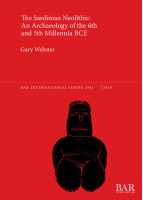Description
Despite Sardinia’s extraordinarily rich Neolithic record, very little of it has made its way into the general European discourse. Written as a companion to G. Webster and M. Webster, Punctuated Insularity. The Archaeology of 4th and 3rd Millennium Sardinia. Oxford: BAR International Series 2871, 2017, the present volume addresses the omission by offering a synthesis of an archaeological corpus still little known outside the island. It covers in detail the evidence of colonisations and subsequent adaptations to the Sardinia’s diverse environments in terms of settlement patterns, craft industries, subsistence economies, mortuary and non-mortuary cult expressions, imagery, art and extra-insular relations with special emphasis of neighbouring Corsica, while offering interpretive suggestions. As a study of the frequentation and settling of Sardinia as a locale, a large, insular, west-Mediterranean landmass, by people with non-indigenous heritages, it furthermore locates the island’s cultural modalities within the so-called neolithisation of the broader Tyrrhenian region during the sixth and fifth millennia BCE.
AUTHOR
Gary Webster is a retired Associate Professor of Anthropology (Penn State University) and Docent in Archaeology (Umeå University). He has published widely on theoretical issues, as well as archaeological fieldwork and interpretive problems, especially relating to Sardinian prehistory.
REVIEW
‘It is an exhaustive summary of an extraordinarily rich period of innovative elements and original artistic productions for Sardinia, which reflect the cultural liveliness of the Mediterranean Neolithic.’ Prof. Anna Depalmas, Università degli Studi di Sassari
‘This is a very important and original contribution as there is currently no book at all (in English and targeted to an international audience) about Neolithic Sardinia. … [T]his would make an excellent companion to the previous book from the authors (Punctuated Insularity) which covers the later Copper Age period in Sardinia.’ Dr. Guillaume Robin, University of Edinburgh











